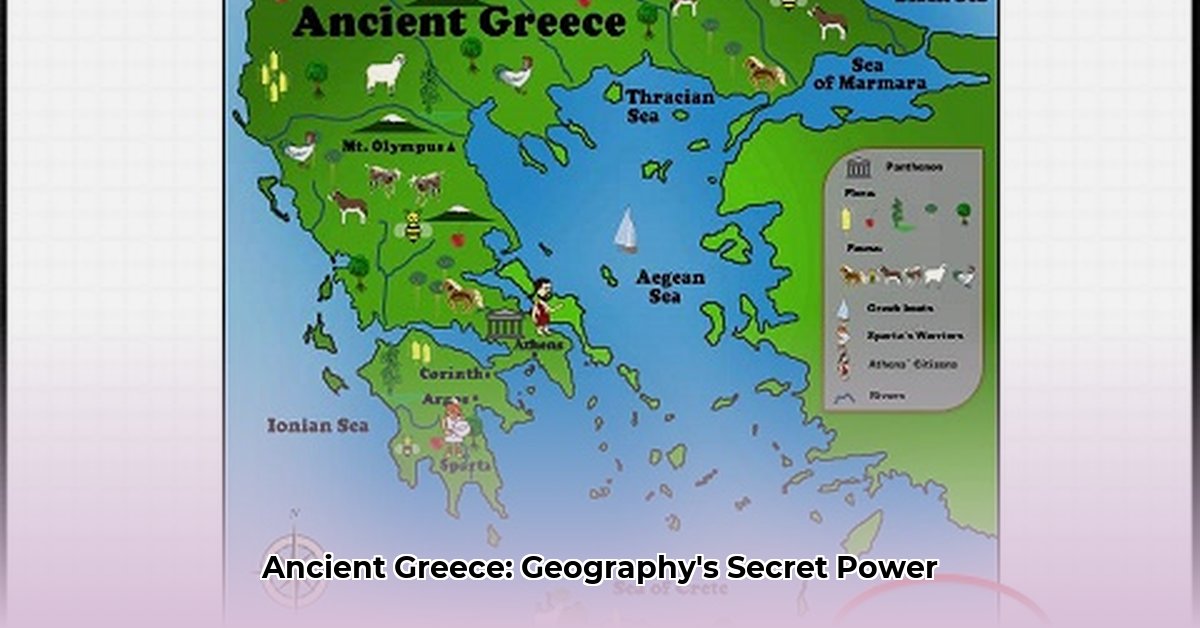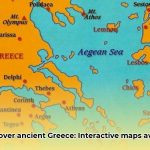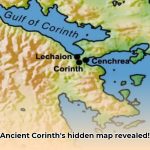Have you ever wondered how the land we inhabit shapes our lives? Ancient Greece provides a compelling case study. More than just a tale of iconic mountains and azure seas, it’s a story of how geography profoundly influenced the emergence of legendary city-states like Athens and Sparta. We’ll delve into how the rugged mountains, intricate coastline, and scattered islands sculpted everything from governance and economic strategies to expansion patterns and communal identities. We’ll examine the navigation difficulties posed by the landscape, and how seafaring and trade fostered unprecedented opportunities. To learn more about the impact of location on Greek culture, check out this article on [Ancient Greek theatre](https://www.lolaapp.com/ancient-greek-theatre-history/). Join us on a historical expedition, where mountains, seas, and the strategic decisions made by the ancient Greeks reveal the captivating interplay between civilization and its environment.
Geography of Ancient Greece: A Foundation for Civilization
Mountains and seas as catalysts of civilization
Ancient Greece was more than just a location; it was a tapestry of dramatic geographic contrasts, a land where the landscape itself played a pivotal role in the unfolding drama of its civilization. Envision a terrain sculpted by powerful geological forces, a mesmerizing blend of towering mountains, plunging valleys, and a coastline so intricately detailed it seems tailor-made for seafaring exploration. This was not mere backdrop; this geography underpinned the very fabric of Greek society. The Greek landscape was a dynamic participant in the construction and evolution of their society.
The Mountains: Natural Barriers and Economic Drivers
Impact of Mountain Ranges on Socio-Economic Development
Imagine the challenge of constructing roads across the rugged terrain of ancient Greece, with its towering peaks and deep valleys. Such an undertaking would have been incredibly arduous, severely restricting travel and communication between settlements. The formidable mountains acted as natural dividers, creating pockets of isolation that discouraged unification. Instead of a sprawling, unified kingdom, this fragmented landscape nurtured the development of independent city-states, or poleis – essentially, autonomous mini-nations. Each polis, nestled within its secluded mountain valley or coastal plain, charted its own course, fostering unique cultural identities and traditions. This geographic isolation wasn’t just a physical barrier; it was a crucible for distinct societies. Archaeological discoveries continue to reveal the unique attributes of each polis, illustrating the profound impact of their location on their culture and social dynamics. Ongoing research enriches our understanding of the intricate relationship between geography and cultural evolution.
Furthermore, the mountains shaped local economies. Each polis largely relied on its own resources, fostering a strong sense of self-sufficiency and autonomy. While trade remained vital, the challenging terrain pushed the Greeks towards seafaring and coastal commerce. The scarcity of easily navigable routes between inland poleis may explain why unified empires were so rare in ancient Greece. Some historians contend that this geographic fragmentation directly contributed to the flourishing of independent political thought and democratic principles.
The Sea: A Conduit for Trade and a Source of Power
Seafaring Influence on Trade Routes
Alongside mountains, the sea influenced Greek civilization. The extensive coastline, a crucial network of countless harbors, opened doors to the Mediterranean and beyond. The sea became the primary highway, connecting Greeks and facilitating the exchange of goods and ideas. It facilitated the spread of Greek culture, leading to the establishment of colonies along the Mediterranean, Black Sea, and beyond. Each new colony introduced variations on Greek traditions, highlighting cultural exchange and adaptation. The sea facilitated the flow of resources that fueled the growth of the Greek world.
However, access to the sea also introduced challenges and conflicts. Coastal regions became strategically important, prompting competition and warfare between poleis. The sea’s immense influence was not always positive. The same waters that brought prosperity could unleash the fury of storms and pirates, reminding the Greeks that their prosperity was strongly linked to their ability to both utilize and control the sea.
Geography’s Impact on Government and Society
Government Adaptations to Geographical Challenges
The physical environment wasn’t just a backdrop; it fundamentally shaped the political and social structures of ancient Greece. The relative isolation of the poleis fostered a strong sense of communal identity and civic pride. People within each polis felt a close connection, developing intense loyalty and a shared sense of belonging. Consider Athens and Sparta, two powerful city-states in relatively close proximity but with immensely different governance and societal values. Many historians believe their stark differences were largely influenced by the variations in their respective terrains and resources. Ongoing research explores this and other key questions, examining how local geography shaped the development of varied cultural traits within the Greek world.
The challenging geography also impacted military strategy and political organization. Local defense led to citizen militias, in contrast to large, centrally controlled armies. This decentralized military structure fostered civic participation, open debate, and individual rights, which led to the emergence of democracy in Athens, where political discussion was critical in decision-making.
Rethinking Ancient History: Ongoing Debates and Discoveries
Discoveries Changing Historical Understandings
The development of the polis wasn’t merely a product of geography; social and political factors also played significant roles. Recent archaeological findings, particularly at sites like Lefkandi, revise assumptions about the “Greek Dark Ages”. The discovery of sophisticated tools and evidence of trade suggest that connectivity and progress were not uniformly interrupted.
Nevertheless, the influence of Greece’s unique geography remains undeniable. The rugged mountains, the extensive coastline, and the resulting isolation shaped the political, economic, and social structures. The story of how geography shaped this civilization is ongoing, and each discovery helps us refine our understanding of their remarkable relationship. The legacy of ancient Greece, linked to its geography, inspires us today.
Key Geographic Influences: A Quick Summary
| Geographic Feature | Impact on Ancient Greece |
|---|---|
| Mountainous Terrain | Created isolated regions; fostered independent city-states; limited communication; shaped local economies; influenced defense strategies; promoted regional identities; hindered large-scale unification; inspired myths and legends related to mountain gods |
| Extensive Coastline | Facilitated trade and colonization; provided access to the Mediterranean and beyond; spurred maritime dominance; promoted cultural exchange; encouraged seafaring skills; necessitated naval power for defense; influenced settlement patterns along the coast |
| Numerous Bays and Inlets | Created natural harbors; enhanced seafaring and trade; supported fishing industries; played a role in naval warfare tactics |
The exploration of Ancient Greece’s geography is an ongoing journey, a testament to the enduring influence of this landscape on one of history’s civilizations. Approximately 80% of Greece is mountainous.
How did geographical factors influence the diverse development of ancient Greek poleis?
Geography Shaping Political Systems
Key Takeaways:
- The fragmented terrain of ancient Greece led to the formation of independent city-states (poleis).
- Access to the sea shaped economies.
- Geographical features influenced religious beliefs.
- Diverse geographical conditions led to varying agricultural practices.
- Geography influenced the contrast between Athens’ democracy and Sparta’s militaristic oligarchy.
The Rugged Landscape: Birthplace of Independent City-States
Topography’s Role
Imagine a land carved by nature – jagged mountains, deep valleys, and a coastline riddled with inlets and harbors. This was ancient Greece, a landscape that impacted civilization. How did geographical factors influence the diverse development of ancient Greek poleis? The terrain fragmented the region, hindering the formation of a unified state. Instead, isolated valleys and coastal plains nurtured independent city-states.
The Alluring Sea: Lifeblood of the Polis
Maritime Access Shaping Economies
The sea connected. The coastline provided natural harbors, transforming coastal poleis into trade centers. Picture ships laden with goods from across the Mediterranean, merchants haggling, and economic and cultural growth. This maritime trade network created interdependence, fostering exchange. This accessibility to the sea contrasted with inland poleis, shaping economic strategies.
Mountains and Myths: Shaping Religious Beliefs
Greek reverence for the gods was tied to the land. Mountains became sacred spaces. The sea, with its power, also held a sacred place, inspiring tales of gods and monsters. How did geographical factors influence the diverse development of ancient Greek poleis? In shaping the spiritual landscape.
From Olives to Oligarchies: Geography’s Subtle Influence
Resources Impacting Societal Structures
The influence of geography extends beyond empires and trade. It’s in the details – rocky soil dictating agricultural practices. Olive cultivation became a mainstay, shaping economic life. Athens uncertainties of the olive harvest contributed to democracy. Contrast this with Sparta, its geography fostering a militaristic society.
A Legacy Etched in Stone
Ancient Greece’s legacy is in its geography shaping civilization. The landscape nurtured diverse city-states, each molded by its environment. The sea connected poleis, fostering exchange. The mountains influenced religious belief. The land dictated paths. Their story, of fragmented unity, resilience, and achievement, is a testament to geography’s power. With a stunning coastline stretching approximately 16,000 kilometers.
Ancient Greek Colonization: Impact on Polis Development and Trade Networks
Why the Greeks favored colonization
Key Takeaways:
- Ancient Greek colonization was driven by overpopulation, resource scarcity, and the economy.
- This expansion impacted the polis system and trade networks.
- The interaction between Greek colonists and indigenous populations was complex.
- Ancient Greek Colonization: Impact on Polis Development and Trade Networks led to the spread of Greek culture, and shaped the destinies of societies.
- The forms of government adopted by the colonies illustrate the dynamic nature of the colonization process.
- Debates continue about the degree of cultural dominance exerted by Greek colonists.
The Geographic Seeds of Empire: How Terrain Shaped Colonization
Terrain Effecting the Rise of the Economy
Imagine the landscape: rugged mountains plunging into a sparkling sea, a patchwork of fertile valleys interspersed with arid plains. This was the cradle of ancient Greece, a terrain that propelled its people towards expansion. Limited arable land spurred overseas ventures. Ancient Greek Colonization: Impact on Polis Development and Trade Networks was dictated by geography.
The polis itself was a product of this geography. Each polis developed its own identity. The isolated nature of these settlements fostered local autonomy. The mountainous terrain divided the population, hindering large empires and contributing to smaller, independent poleis.
The Sea: Lifeline and Highway of Empire
Navigation Influencing Expansion
The sea was a highway. The Greek coastline provided natural anchorages, facilitating trade and exploration. Access to the sea was crucial for resources and trade routes. Ancient Greek Colonization: Impact on Polis Development and Trade Networks thrived on connectivity. The Mediterranean became a marketplace, connecting Greek colonies with the world.
The Rise of Trade Networks: A Ripple Effect
Trade Relations Changing the Landscape
Colonies became nodes in trade networks, acting as outposts for the exchange of goods. Harbors brimmed with wine, olive oil, and pottery. Raw materials flowed toward Greece while manufactured goods were shipped to the colonies. This interconnectedness reshaped the economic landscape.
Cultural Exchange and Conflict: A Complex Legacy
Colonization Affecting Culture
The encounter between Greek colonists and indigenous peoples was not uniform. Sometimes, it was peaceful; other times, it involved conflicts. Cultural exchange created hybrid cultures. The story of Ancient Greek Colonization: Impact on Polis Development and Trade Networks is one of cultural imposition and adaptation.
Lasting Impacts: A Legacy Echoes Through Time
Lasting Impact
The impact of Ancient Greek Colonization: Impact on Polis Development and Trade Networks extends beyond the ancient world. The colonies developed systems, economies, and cultural identities, shaping history. The legacy of Greek colonization continues to influence our understanding of history, culture, and the relationship between geography and civilization. An estimated 1.5 million Greeks migrated overseas during colonization.
Synoikismos in Ancient Greece: Unification Processes and their Geographic Context
Processes Influencing State Formations
Key Takeaways:
- The rise of the Greek polis was a gradual process of merging settlements (synoikismos).
- Geography played a role; terrain influenced unification.
- Synoikismos involved peaceful integration and consolidation, leading to diverse city-state structures.
- The success of a polis depended on internal cohesion and external factors.
- The decline of the polis underscores limitations.
The Shaping Hand of Geography
Geographical Context Impacting Development
Imagine ancient Greece: mountains, valleys, and a coastline. This was a force shaping history. Synoikismos in Ancient Greece: Unification Processes and their Geographic Context is central to understanding this. The mountains isolated communities. The same mountains provided resources. How did these features influence the development of city-states?
These settlements coalesced into larger entities. This process, known as synoecism, wasn’t harmonious. It was planned unification, or the result of necessity. This process created the polis, or city-state.
The Polis: A Hub of Power and Culture
Geography Shaping Culture
The polis became the heart of life, serving as a point for decision-making, exchange, and culture. Its influence extended beyond its walls. This relationship between city and countryside was crucial for survival. Landscapes affected this relationship.
Consider the impact of the sea. Access to the sea opened trade routes. Coastal cities thrived. This maritime advantage played a key role.
Case Studies: Athens and Sparta
Two Cities Developing Differently
Examine Athens and Sparta. Athens benefited from fertile land and access to the sea. Its unification laid the foundation for growth. Sparta occupied a less advantageous position. Its geography fostered a structure. Did their geographies contribute to structures?
These examples highlight synoecism. It was a series of events shaped by factors. The resulting diversity remains a testament to agency and the environment.
The Legacy of Synoikismos
Lasting Lessons About Geography
The legacy of synoecism extends beyond the era. The rise and fall of city-states offer lessons about unification and context. Their successes shaped civilization. Studying Synoikismos in Ancient Greece: Unification Processes and their Geographic Context allows understanding. The process of synoikismos spanned centuries.
- Discover Ancient Greece Weapons: A Comprehensive Guide to Military Technology - August 8, 2025
- Discover Ancient Greek Swords: A Comprehensive Guide - August 8, 2025
- Explore Ancient Athens: Unveiling the City’s Secrets Through Maps - August 8, 2025
















